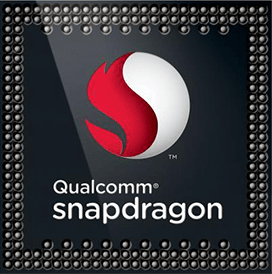
Qualcomm Snapdragon 870 Benchmark, Test and specs
Last updated:
The Qualcomm Snapdragon 870 is a 8 core processor. It can process 8 threads concurrently and is based on the 7. gen of the Qualcomm Snapdragon series. The processor was released in Q2/2021. The Qualcomm Snapdragon 870 scores 996 points with one CPU core in the Geekbench 5 benchmark. When using all CPU cores, the result is 3,240 points.

| Name: | Qualcomm Snapdragon 870 |
|---|---|
| Family: | Qualcomm Snapdragon (102) |
| CPU group: | Qualcomm Snapdragon 865/870 (3) |
| Architecture: | Kryo 585 |
| Segment: | Mobile |
| Generation: | 7 |
| Predecessor: | -- |
| Successor: | -- |
CPU Cores and Base Frequency
The 8 CPU cores of the Qualcomm Snapdragon 870 clock with 3.20 GHz. The number of CPU cores and the clock frequency of the processor are largely responsible for the overall performance.
| CPU Cores / Threads: | 8 / 8 |
|---|---|
| Core architecture: | hybrid (Prime / big.LITTLE) |
| A-Core: | 1x Kryo 585 Prime |
| B-Core: | 3x Kryo 585 Gold |
| C-Core: | 4x Kryo 585 Silver |
| Hyperthreading / SMT: | No |
|---|---|
| Overclocking: | No |
| A-Core Frequency: | 3.20 GHz |
| B-Core Frequency: | 2.42 GHz |
| C-Core Frequency: | 1.80 GHz |
Artificial Intelligence and Machine Learning
Processors with the support of artificial intelligence (AI) and machine learning (ML) can process many calculations, especially audio, image and video processing, much faster than classic processors. Algorithms for ML improve their performance the more data they have collected via software. ML tasks can be processed up to 10,000 times faster than with a classic processor.
| AI hardware: | Qualcomm AI engine |
|---|---|
| AI specifications: | Hexagon 698 @ 15 TOPS |
Internal Graphics
With the Qualcomm Adreno 650, the Qualcomm Snapdragon 870 has an build in graphic solution. It has 2 SM processors, which have a total of 512 texture shaders. The iGPU not only enables games, but also significantly accelerates video playback.
| GPU name: | Qualcomm Adreno 650 |
|---|---|
| GPU frequency: | 0.25 GHz |
| GPU (Turbo): | 0.67 GHz |
| Compute units: | 2 |
| Shader: | 512 |
| Hardware Raytracing: | No |
| Release date: | Q4/2019 |
| Max. displays: | 1 |
|---|---|
| Generation: | 6 |
| Direct X: | 12.0 |
| Technology: | 7 nm |
| Max. GPU Memory: | -- |
| Frame Generation: | No |
Hardware codec support
Processors that have an integrated graphics can play videos faster and more efficiently. This can have a positive effect on the battery life of notebooks, for example.
| h265 / HEVC (8 bit): | Decode / Encode |
|---|---|
| h265 / HEVC (10 bit): | Decode / Encode |
| h264: | Decode / Encode |
| VP8: | Decode / Encode |
| VP9: | Decode / Encode |
| AV1: | No |
|---|---|
| AVC: | Decode |
| VC-1: | Decode |
| JPEG: | Decode / Encode |
Memory & PCIeThe Qualcomm Snapdragon 870 supports up to 16 GB memory in up to 4 (Quad Channel) memory channels. This results in a maximum memory bandwidth of 44.0 GB/s. |
|
| Memory type: | Memory bandwidth: |
|---|---|
| LPDDR5-5500 LPDDR4X-4266 | 44.0 GB/s 34.1 GB/s |
| Max. Memory: | 16 GB |
| Memory channels: | 4 (Quad Channel) |
| ECC: | No |
| PCIe: | |
| PCIe Bandwidth: | -- |
Thermal ManagementWith the TDP, the processor manufacturer specifies the cooling solution required for the processor. The Qualcomm Snapdragon 870 has a TDP of 10 W. |
|
|---|---|
| TDP (PL1 / PBP): | 10 W |
| TDP (PL2): | -- |
| TDP up: | -- |
| TDP down: | -- |
| Tjunction max.: | -- |
Technical details
The Qualcomm Snapdragon 870 has a 9.00 MB large cache. The processor is manufactured in 7 nm. Modern production increases the efficiency of the processor.
| Technology: | 7 nm |
|---|---|
| Chip design: | Chiplet |
| Socket: | -- |
| L2-Cache: | 2.00 MB |
| L3-Cache: | 7.00 MB |
| AES-NI: | No |
| Operating systems: | Android |
| Virtualization: | None |
|---|---|
| Instruction set (ISA): | Armv8-A (64 bit) |
| ISA extensions: | -- |
| Release date: | Q2/2021 |
| Release price: | -- |
| Part Number: | SM8250-AC |
| Documents: | Technical data sheet |
Rate this processor
Benchmark results

The benchmark results for the Qualcomm Snapdragon 870 have been carefully checked by us. We only publish benchmark results that have been created by us or that have been submitted by a visitor and then checked by a team member. All results are based on and fullfill our benchmark guidelines.
Screenshots:
Screenshots:
Geekbench 5, 64bit (Single-Core)
Geekbench 5 is a cross plattform benchmark that heavily uses the systems memory. A fast memory will push the result a lot. The single-core test only uses one CPU core, the amount of cores or hyperthreading ability doesn't count.

|
Intel Core i7-5960X
8C 16T @ 3.50 GHz |
||

|
Intel Xeon E5-2667 v4
8C 16T @ 3.60 GHz |
||

|
Intel Core i7-5775C
4C 8T @ 3.70 GHz |
||
|
|
Qualcomm Snapdragon 870
8C 8T @ 3.20 GHz |
||

|
Intel Core i3-10110Y
2C 4T @ 4.00 GHz |
||

|
Intel Core i3-9300T
4C 4T @ 3.80 GHz |
||

|
Intel Xeon E3-1265L v3
4C 8T @ 3.70 GHz |
||
Geekbench 5, 64bit (Multi-Core)
Geekbench 5 is a cross plattform benchmark that heavily uses the systems memory. A fast memory will push the result a lot. The multi-core test involves all CPU cores and taks a big advantage of hyperthreading.

|
Intel Core i3-9100
4C 4T @ 3.80 GHz |
||

|
Intel Core i7-6700TE
4C 8T @ 2.40 GHz |
||

|
Intel Core i7-4770R
4C 8T @ 3.60 GHz |
||
|
|
Qualcomm Snapdragon 870
8C 8T @ 3.20 GHz |
||

|
AMD Ryzen 3 5300U
4C 8T @ 3.60 GHz |
||

|
MediaTek Dimensity 1300
8C 8T @ 3.00 GHz |
||

|
Intel Core i5-4670K
4C 4T @ 3.60 GHz |
||
Geekbench 6 (Single-Core)
Geekbench 6 is a benchmark for modern computers, notebooks and smartphones. What is new is an optimized utilization of newer CPU architectures, e.g. based on the big.LITTLE concept and combining CPU cores of different sizes. The single-core benchmark only evaluates the performance of the fastest CPU core, the number of CPU cores in a processor is irrelevant here.

|
Intel Core i5-7267U
2C 4T @ 3.50 GHz |
||

|
MediaTek Dimensity 8020
8C 8T @ 2.60 GHz |
||

|
Intel Xeon E5-2697 v4
18C 36T @ 3.60 GHz |
||
|
|
Qualcomm Snapdragon 870
8C 8T @ 3.20 GHz |
||

|
MediaTek Dimensity 8100
8C 8T @ 2.85 GHz |
||

|
MediaTek Dimensity 7200
8C 8T @ 2.80 GHz |
||

|
AMD Ryzen 3 1300X
4C 4T @ 3.90 GHz |
||
Geekbench 6 (Multi-Core)
Geekbench 6 is a benchmark for modern computers, notebooks and smartphones. What is new is an optimized utilization of newer CPU architectures, e.g. based on the big.LITTLE concept and combining CPU cores of different sizes. The multi-core benchmark evaluates the performance of all of the processor's CPU cores. Virtual thread improvements such as AMD SMT or Intel's Hyper-Threading have a positive impact on the benchmark result.

|
AMD Ryzen 7 3700U
4C 8T @ 3.50 GHz |
||

|
Intel Core i5-4440
4C 4T @ 3.20 GHz |
||

|
Intel Core i5-4570S
4C 4T @ 3.20 GHz |
||
|
|
Qualcomm Snapdragon 870
8C 8T @ 3.20 GHz |
||

|
Intel Core i5-1034G1
4C 8T @ 3.30 GHz |
||

|
Intel Core i5-4690S
4C 4T @ 3.50 GHz |
||

|
Intel Xeon D-1520
4C 8T @ 2.20 GHz |
||
iGPU - FP32 Performance (Single-precision GFLOPS)
The theoretical computing performance of the internal graphics unit of the processor with simple accuracy (32 bit) in GFLOPS. GFLOPS indicates how many billion floating point operations the iGPU can perform per second.

|
AMD Ryzen 7 4700U
AMD Radeon RX Vega 7 (Renoir) @ 1.60 GHz |
||

|
AMD Ryzen 7 4800H
AMD Radeon RX Vega 7 (Renoir) @ 1.60 GHz |
||

|
Samsung Exynos 2200
Samsung Xclipse 920 @ 1.30 GHz |
||
|
|
Qualcomm Snapdragon 870
Qualcomm Adreno 650 @ 0.67 GHz |
||

|
Qualcomm Snapdragon 865+
Qualcomm Adreno 650 @ 0.67 GHz |
||

|
Intel Core i5-1140G7
Intel Iris Xe Graphics 80 (Tiger Lake) @ 1.10 GHz |
||

|
Intel Core i5-1130G7
Intel Iris Xe Graphics 80 (Tiger Lake) @ 1.10 GHz |
||
AnTuTu 9 Benchmark
The AnTuTu 9 benchmark is very well suited to measuring the performance of a smartphone. AnTuTu 9 is quite heavy on 3D graphics and can now also use the "Metal" graphics interface. In AnTuTu, memory and UX (user experience) are also tested by simulating browser and app usage. AnTuTu version 9 can compare any ARM CPU running on Android or iOS. Devices may not be directly comparable when benchmarked on different operating systems.
In the AnTuTu 9 benchmark, the single-core performance of a processor is only slightly weighted. The rating is made up of the multi-core performance of the processor, the speed of the working memory, and the performance of the internal graphics.
In the AnTuTu 9 benchmark, the single-core performance of a processor is only slightly weighted. The rating is made up of the multi-core performance of the processor, the speed of the working memory, and the performance of the internal graphics.

|
Google Tensor G2
8C 8T @ 2.85 GHz |
||

|
Apple A12Z Bionic
8C 8T @ 2.49 GHz |
||

|
Apple A14 Bionic
6C 6T @ 3.00 GHz |
||
|
|
Qualcomm Snapdragon 870
8C 8T @ 3.20 GHz |
||

|
Samsung Exynos 2100
8C 8T @ 2.90 GHz |
||

|
Qualcomm Snapdragon 865+
8C 8T @ 3.10 GHz |
||

|
Google Tensor
8C 8T @ 2.80 GHz |
||
AnTuTu 8 Benchmark
The AnTuTu 8 Benchmark measures the performance of a SoC. AnTuTu benchmarks the CPU, GPU, Memory as well as the UX (User Experience) by simulating browser and app usage. AnTuTu can benchmark any ARM CPU that runs under Android or iOS. Devices may not be directly compareable if the benchmark has been performed under different operating systems.
In the AnTuTu 8 benchmark, the single-core performance of a processor is only slightly weighted. The evaluation consists of the multi-core performance of the processor, the speed of the RAM and the performance of the internal graphics.
In the AnTuTu 8 benchmark, the single-core performance of a processor is only slightly weighted. The evaluation consists of the multi-core performance of the processor, the speed of the RAM and the performance of the internal graphics.

|
Qualcomm Snapdragon 888+
8C 8T @ 3.00 GHz |
||

|
Samsung Exynos 1080
8C 8T @ 2.80 GHz |
||
|
|
HiSilicon Kirin 9000
8C 8T @ 3.13 GHz |
||
|
|
Qualcomm Snapdragon 870
8C 8T @ 3.20 GHz |
||

|
MediaTek Dimensity 1300
8C 8T @ 3.00 GHz |
||

|
MediaTek Dimensity 1100
8C 8T @ 2.60 GHz |
||
|
|
HiSilicon Kirin 9000E
8C 8T @ 3.13 GHz |
||
Estimated results for PassMark CPU Mark
Some of the CPUs listed below have been benchmarked by CPU-monkey. However the majority of CPUs have not been tested and the results have been estimated by a CPU-monkey’s secret proprietary formula. As such they do not accurately reflect the actual Passmark CPU mark values and are not endorsed by PassMark Software Pty Ltd.

|
MediaTek Dimensity 1300
8C 8T @ 3.00 GHz |
||

|
Intel Xeon E5-2608L v3
6C 12T @ 2.00 GHz |
||

|
Intel Core i7-4870HQ
4C 8T @ 2.50 GHz |
||
|
|
Qualcomm Snapdragon 870
8C 8T @ 3.20 GHz |
||

|
Intel Core i7-3770
4C 8T @ 3.90 GHz |
||

|
Intel Xeon D-1528
6C 12T @ 1.90 GHz |
||

|
Qualcomm Snapdragon 778G
8C 8T @ 2.40 GHz |
||
Performance for Artificial Intelligence (AI) and Machine Learning (ML)
Processors with the support of artificial intelligence (AI) and machine learning (ML) can process many calculations, especially audio, image and video processing, much faster than classic processors. The performance is given in the number (trillions) of arithmetic operations per second (TOPS).

|
Apple A15 Bionic (4-GPU)
6C 6T @ 3.23 GHz |
||

|
Apple A15 Bionic (5-GPU)
6C 6T @ 3.23 GHz |
||

|
Apple M2
8C 8T @ 0.66 GHz |
||
|
|
Qualcomm Snapdragon 870
8C 8T @ 3.20 GHz |
||

|
Samsung Exynos 990
8C 8T @ 2.73 GHz |
||

|
Qualcomm Snapdragon 865+
8C 8T @ 3.10 GHz |
||

|
Qualcomm Snapdragon 865
8C 8T @ 2.84 GHz |
||
Benchmarks

Geekbench 5 (SC)
2,488 entries
2,488 entries

Geekbench 5 (MC)
2,461 entries
2,461 entries

Geekbench 6 (SC)
1,754 entries
1,754 entries

Geekbench 6 (MC)
1,702 entries
1,702 entries

FP32 SP (iGPU)
2,026 entries
2,026 entries

AnTuTu 9 Benchmark
90 entries
90 entries

AnTuTu 8 Benchmark
118 entries
118 entries

PassMark CPU-Mark
2,391 entries
2,391 entries

AI / ML Performance
116 entries
116 entries
Description of the processor
The Qualcomm Snapdragon 870 is a high-end smartphone processor from Qualcomm based on the Kryo 585 architecture. The core design comes from ARM and is used under license from Qualcomm.With 8 CPU cores in a hybrid structure and the use of a high-clocked Prime core, the Qualcomm Snapdragon 870 is fast enough for all the tasks you want to do with your smartphone. The Prime core clocks at up to 3.2 GHz. It is supplemented by three additional P-cores (Kryo 585 Gold) with a maximum clock frequency of 2.42 GHz.
4 Kryo 585 Silver CPU cores are available for background tasks or tasks with weak computing power. Although these only clock at 1.8 GHz, they are particularly energy efficient. The Qualcomm Snapdragon 870 also has the Qualcomm Hexagon 698 AI accelerator, which reaches 15 TOPS and significantly accelerates certain scenarios such as video and image processing.
The Adreno 650 is used as graphics in the Qualcomm Snapdragon 870. With 512 texture shaders and a theoretical FP32 computing power of 1.4 TFLOPS, it is fast enough to play modern smartphone games smoothly.
Devices with the Qualcomm Snapdragon 870 can be equipped with up to 16 GB of RAM. The CPU supports both the older LPDDR4X-4266 memory with a memory bandwidth of 34.1 GB/s and the newer LPDDR5-5500 memory, which has a maximum of 44 GB/s.
The manufacturer does not specify the TDP and thus the maximum energy consumption of the Qualcomm Snapdragon 870, but this can be estimated fairly well with special software. For the Qualcomm Snapdragon 870 we assume a TDP of 10 watts, which is identical to other high-end smartphone processors from other manufacturers.
The Qualcomm Snapdragon 870 is manufactured using a 7 nm process, which is relatively energy-saving.
Popular comparisons
back to index






